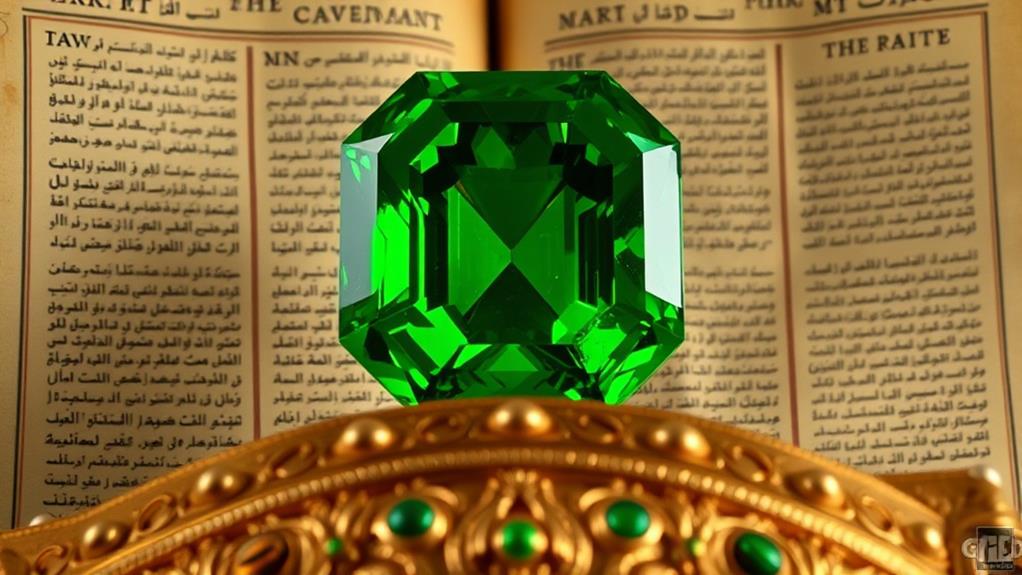Beryl Name Meaning in the Bible
The term “beryl” in the Bible originates from the Hebrew word “tarshish,” symbolizing a precious stone known for its pale green to sea-green color and characteristic six-sided outline, embodying strength, resilience, and spiritual significance rooted in biblical tradition. Beryl holds spiritual importance, representing diverse hues that symbolize unity and harmony, as well as healing properties for emotional and physical well-being. It is associated with divine power and renewal, and is celebrated in Christian tradition for its diverse colors and spiritual significance. Exploring beryl’s complex attributes reveals deeper insights into its reverent symbolism and historical references in scripture.
Key Takeaways
- Biblical Origin: The term “Beryl” in the Bible likely originates from the Hebrew word “tarshish,” referring to a precious stone.
- Spiritual Significance: Beryl symbolizes strength, resilience, and unity, representing diverse hues that symbolize harmony in biblical tradition.
- Symbolic Meaning: Beryl is associated with themes of happiness, truth, and faith, interpreted as a symbol of God’s Spirit of power and might.
- Biblical References: Beryl is mentioned on the High Priest’s breastplate, Lucifer’s adornments, and in prophetic visions, symbolizing ethical steadfastness and divine purity.
- Name Meaning: Beryl as a name means “a green jewel” or “intelligent” in biblical context, derived from the Greek “berullos” via Sanskrit “vaidurya”.
Biblical Origins of Beryl

The term “Beryl” in the Bible originates from the Hebrew word “tarshish,” which refers to a precious stone, likely named after the place Tarshish in Spain. This gemstone is known for its pale green to sea-green color, although it can also appear in yellowish, bluish, brownish, or colorless varieties. Its properties include a characteristic six-sided outline and a relative hardness of 8, making it a durable and prized gemstone. Symbolically, beryl reflects qualities such as strength and resilience, akin to the virtues associated with the name Charlotte, which embodies spiritual growth and leadership in biblical contexts spiritual dimensions of names.
Biblically, beryl holds significant importance. It is mentioned as the first stone in the fourth row of the high priest’s breastplate (Exodus 28:20, 39:13) and is compared to the color of the cherubic wheels in Ezekiel 1:16 and 10:9. Additionally, beryl is listed among the precious stones adorning Lucifer before his fall (Ezekiel 28:13) and is the eighth foundation gemstone in the New Jerusalem (Revelation 21:20). Its appearance in the Bible symbolizes spiritual purity and divine wisdom, making it a stone of deep religious significance.
The biblical references to beryl highlight its importance not only as a gemstone but also as a symbol imbued with spiritual and mythological significance.
Spiritual Significance of Beryl
As a gemstone deeply rooted in biblical tradition, beryl holds a multifaceted spiritual importance. This mineral, appearing in different colors and known for its various types such as emerald and aquamarine, is imbued with rich symbolic meanings. The spiritual importance of beryl encompasses a broad spectrum of divine properties and applications, reflecting its profound impact on spiritual and emotional well-being. Its diverse hues can also symbolize unity and divine order, reminding individuals of the significance of embracing spiritual growth and harmony in their lives.
Beryl is renowned for its healing properties, which are believed to promote spiritual balance and well-being. Its various colors are associated with different aspects of healing, from emotional tranquility to physical vitality.
For instance, green beryl (emerald) is often associated with heart-centered healing, while blue beryl (aquamarine) is said to enhance communication and emotional clarity.
Moreover, beryl is often invoked for divine protection, offering a shield against negative energies and fostering a sense of security and inner peace. This gemstone’s ability to connect individuals with higher forms of spirituality and divine wisdom underscores its spiritual importance.
Symbolism and Meaning of Beryl

Christian tradition and biblical references weave a rich tapestry of symbolism and meaning around beryl, a gemstone celebrated for its diverse colors and spiritual significance. The Bible mentions beryl in various contexts, highlighting its importance in religious and symbolic interpretations. In Ezekiel 1:16 and 10:9, the appearance of the cherubic wheels is likened to the color of beryl, symbolizing divine power and strength.
Additionally, beryl resonates with themes of renewal and transformation, much like the qualities associated with the name Ashley, which also embodies divine grace and endurance symbolizing strength and resilience. Furthermore, beryl is listed as a precious stone adorning Lucifer in Ezekiel 28:13, emphasizing its beauty and spiritual significance before his fall.
Biblical connections also associate beryl with happiness, everlasting youth, truth, charity, and faith. As the eighth foundation stone in the New Jerusalem (Revelation 21:20), beryl is often interpreted as a symbol of God’s Spirit of power and might. The gemstone’s various colors, including sea-green and blue-green, are believed to reflect God’s power as the Giver of Life Eternal.
Through these symbolic interpretations, beryl emerges as a complex and multifaceted gemstone, embodying spiritual and divine attributes that resonate deeply within Christian tradition.
Historical References in Scripture
Historical references in Scripture underscore the significance of beryl in various contexts, providing insight into its symbolic and spiritual importance. Beryl is mentioned in the Bible as one of the stones on the High Priest’s breastplate in Exodus 28:20 and 39:13, and it is also associated with the fourth stone adorning Lucifer before he fell from grace in Ezekiel 28:13. These mentions highlight beryl’s connection to both divine and fallen powers, suggesting its complex symbolism.
Additionally, the name beryl symbolizes commitment to purpose and ethical steadfastness, reflecting virtues such as diligence and perseverance, which are echoed in other biblical teachings like those surrounding names such as Amelia symbolism of names. In poetic contexts, beryl is used metaphorically to describe beauty and brilliance, as seen in Song of Solomon 5:14, where the beloved’s hands are compared to “gold rings set with the beryl.” This use of beryl in poetry emphasizes its aesthetic and symbolic value, reinforcing its association with spiritual and divine themes.
Beryl’s appearance in prophetic visions, such as Ezekiel 1:16 and 10:9, where the color of the wheels is likened to that of beryl, further underscores its significance. These references collectively demonstrate beryl’s multifaceted role in the Bible, bridging divine revelation, spiritual symbolism, and poetic imagery, thereby enriching our understanding of its importance.
Beryl’s Role in Biblical Prophecy**

Beryl’s role in biblical prophecy is underscored by its inclusion in visions of divine revelation and its association with significant prophetic figures. In Ezekiel 28:13, beryl is listed among the precious stones adorning the King of Tyre, symbolizing spiritual perfection before his fall. This connection hints at the significance of beryl in end times prophecy.
The presence of beryl in Revelation 21:20, as the eighth foundation gemstone of the New Jerusalem, highlights its importance in Revelation symbolism. The various interpretations of beryl in different Bible versions—ranging from pale-green to yellow and even blue-green—emphasize its adaptability in representing divine qualities. The incorporation of beryl in the High Priest’s breastplate in Exodus 28:20 further emphasizes its role in bridging the earthly and spiritual domains.
In prophetic contexts, beryl often signifies purity and divine light. Its connection with figures like the King of Tyre and its inclusion in the New Jerusalem highlight its role in symbolizing spiritual enlightenment and perfection.
The multiple color variations of beryl mentioned in biblical contexts also imply its capacity to convey different aspects of divine revelation. Therefore, beryl in biblical prophecy serves as a symbol of divine clarity and purity.
Frequently Asked Questions
Is Beryl a Common Name in Contemporary Usage?
Beryl is an uncommon name in contemporary usage, primarily known for its Greek origin meaning “pale green precious stone.” It lacks strong Biblical significance and has seen minimal popularity in recent years, with few nickname variations and limited cultural relevance outside its British heritage.
What Are Popular Nicknames for the Name Beryl?
A thousand nicknames would still not do justice to the beauty of Beryl. Popular nicknames for Beryl, a name symbolizing a precious gemstone, include Berry, Rilly, Rylla, and Berri, offering a range of endearing options for those embracing freedom in naming.
Does Beryl Have Any Associations With Gemstones or Minerals?
Beryl is a mineral with historical significance, associated with various gemstones such as emerald, aquamarine, and morganite. Its gemstone meanings vary by color, while its mineral properties include being a beryllium aluminum silicate, offering diverse uses and applications.
In Which Cultures Is the Name Beryl Most Commonly Used?
Curiously, the name Beryl coincides with diverse cultural uses. It is most commonly used in English and German cultures, where its origins are tied to the gemstone, symbolizing intelligence and charm, with peak popularity in the early 20th century.
What Are Some Famous Historical Figures Named Beryl?
Famous historical figures named Beryl include Beryl Markham, a pioneering aviator; Beryl Bainbridge, an English novelist; and Beryl Burton, a champion racing cyclist. These women left lasting legacies in their respective fields, contributing to the cultural relevance of the name.
Names Inspired by Nature and Spirit
Conclusion
Beryl, in biblical context, symbolizes divine power, eternal life, and profound spiritual significance. As the eighth foundational stone in the New Jerusalem, it embodies the infinite vigor of the divine, reflecting the sky and sea’s life-giving force. Its multifaceted symbolism, from truth and charity to happiness and everlasting youth, underscores its sacred essence. Through its references in Exodus, Ezekiel, and Revelation, Beryl’s spiritual weight is underscored, illuminating its role in biblical prophecy and the richness of its symbolic meaning.






